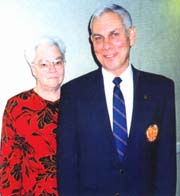
Co-Founders U.S. Chito-ryu Karate Federation
Founders Forum - Winter 1999
Balance
On the Internet is it difficult to properly display the essence of karate-do, either in a technical or a philosophical sense. Karate-do and the training in karate-do is not the world of words. True karate-do does not belong to the world of language; it belongs to the world of training, practice, sweat, pain, and austere discipline called "Shugyo" in Japanese. Karate-do is based upon hard training and responsibility. There is no karate-do without responsibility, only karate-play. True karate-do is to fulfill responsibility. Unfortunately, only very few students of karate-do understand this. They come, taste, and leave without really understanding what they have rejected and lost. They only played at karate, won a few trophies, felt good about themselves and then sadly moved on. Traditional karate-do training is only done by a very few people who have come - stayed - trained for years - have accepted the responsibility to help teach others - and have made a commitment to seek that indescribable something that Doctor Tsuyoshi Chitose, Gichin Funakoshi, Kenwa Mabuni and others have sought. Even if you train in karate for ten or twenty years you might not understand. But karate-do is not for understanding; karate-do is for lifelong, daily training.
People run away from their karate teachers because they believe there is another, better world to run away to. They leave to find themselves. Perhaps if they listened more intently to their original karate teacher, they would not have lost themselves. In actual truth they are not really lost - they only think they are lost and this is even worse. I received a telephone call one night from a former student who informed me that he was leaving his home to travel "to find himself". He told me that he had many troubles and he planned to go out west.
"Your troubles exist in your head", I told him. "Are you going to take your head with you on your travels?"
"Of course" he replied, a little amused by my question.
"Then no matter where you go, your troubles will go with you," I said "you might as well stay home, why haul your problems all over the United States." He thought for a moment and said he would stay home and try to work things out.
He had lost his balance. We all do occasionally. Even Buddhist monks and priests occasionally lose their balance. Roshi (Buddhist Priest) Joshu Sasaki (whom I had the pleasure of meeting and studying under for a short time) once wrote a book entitled "Buddha is the Center of Gravity". Sasaki Roshi told us: "You shouldn't copy anybody else. You shouldn't be caught by my explanation. That is not satori (a technical term used in Zen Buddhism to describe a state of consciousness beyond the plane of discrimination and differentiation. It is the beginning and not the end of true zen training). When you perfectly manifest the center of gravity, there is no self. There is no object. There is no subject. The center of gravity unifies everything. You are the center of gravity since the time before you were born and until after you die. During your lifetime you have the center of gravity and you lose it every day. Not only you but everybody wants to get real freedom. What is real freedom? The real freedom is to embrace everything and at the same time to dwell in everything."
Forty-five years ago I observed a technical examination held by Doctor Tsuyoshi Chitose when I was in Japan the first time. Two students of almost equal skill were among the students who were testing. The one with what I recognized as the best balance, skill and power failed, while the other who had a little less skill, speed and power passed. I asked O-Sensei (with the help of Hidika Ito, my Sempai) why the first one had failed. "Balance bad!" came his reply.
Two weeks later (again with the help of Ito Sensei) I inquired of O-Sensei about his statement of "Balance bad". "I thought the first student had better balance" I said to him. Chitose's dark almost black eyes looked at me for a moment, then he spoke. "First boy, outside balance good but inside balance poor" he informed me "Inside balance most important."
Years later I came to once again realize the wisdom of O-Sensei, Doctor Tsuyoshi Chitose. The first student, who looked so good on the outside, had lost his center of gravity. To regain it he could not depend upon words or books or talking. To regain it would require hard work, training, practice, and a sense of responsibility. Responsibility to whom? This is for you to decide; only beware - if you make the wrong decision you will never achieve a true understanding of karate-do. You will have lost your center gravity and may never regain it.
